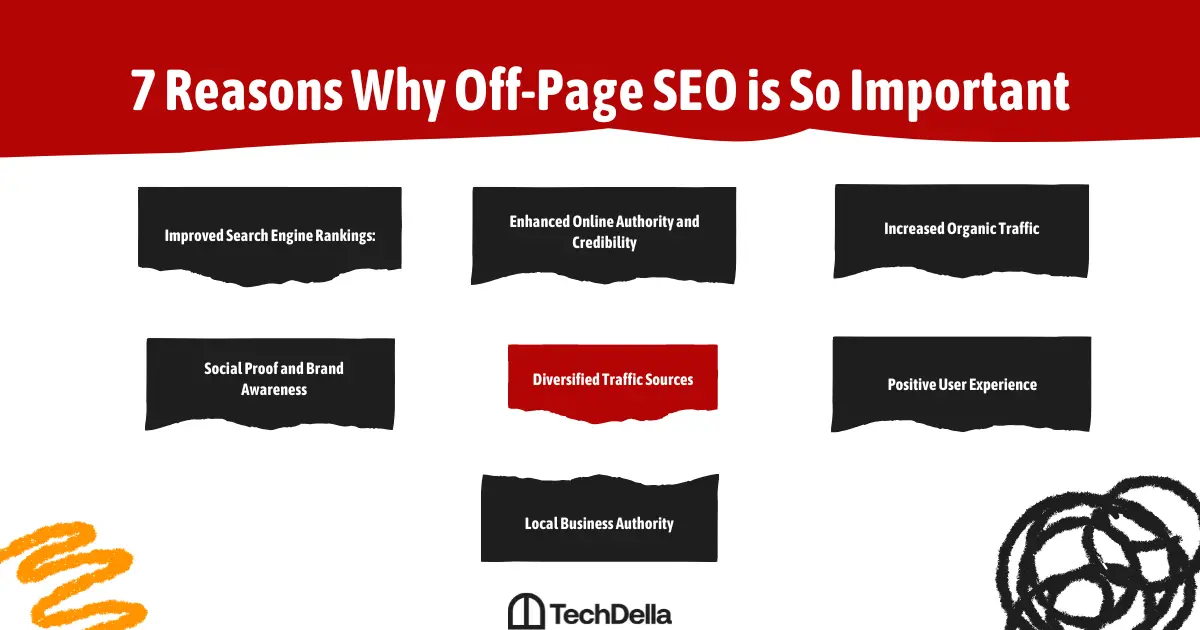
Getting to the top of Google isn’t just about what’s on your website—it’s also about what happens off of it. Off-page SEO is the secret sauce that helps search engines see your site as trustworthy, authoritative, and worth ranking.
From backlinks to social signals, off-page SEO techniques tell Google, “Hey, this site is legit!” And if you’re serious about driving traffic and growing your online presence, these are strategies you can’t afford to ignore.
In this guide, we’ll break down what off-page SEO really is, why it matters, and walk you through 12 effective off-page strategies that can improve your site’s visibility and credibility.
Read more about Using Data-driven SEO Strategy Adjustments
What is Off-Page SEO?
Off-page SEO refers to all the actions you take outside of your website to improve its rankings in search engine results. It’s how you build your site’s authority, credibility, and visibility across the internet. Think of it as your site’s reputation. The better it is, the higher you’ll rank.
For example, if many other reputable websites link to yours, search engines interpret that as a signal of trust. It’s like getting a vote of confidence from other experts in your field.

Check out our guide on SEO for Business Growth
7 Reasons Why Off-Page SEO Matters
Off-page SEO is critically important for several reasons, as it significantly influences a website’s overall performance and visibility in search engine results.
Here are 7 key reasons why off-page SEO is crucial:

1. Improved Search Engine Rankings
Search engines, like Google, consider off-page factors as signals of a website’s authority and relevance. High-quality backlinks from reputable websites are particularly influential in boosting a site’s search engine rankings. The more trustworthy and relevant the linking sites are, the more positively search engines view the linked-to website.
2. Online Authority and Credibility
Off-page SEO helps establish a website as an authoritative and credible source within its industry or niche. When other reputable websites link to your content or mention your brand positively, it contributes to building trust and authority in the eyes of both search engines and users.
3. Increased Organic Traffic
A strong off-page SEO strategy can lead to increased visibility in search engine results, attracting more organic traffic to your website. As your website’s authority grows, search engines are more likely to rank your pages higher, making them more accessible to users actively searching for relevant information.
4. Social Proof and Brand Awareness
Social media signals and mentions on various platforms contribute to social proof and brand awareness. Engaging with your audience on social media, sharing valuable content, and having your content shared by others can amplify your reach and expose your brand to a broader audience.
5. Diversified Traffic Sources
Relying solely on on-page SEO may limit your website’s exposure. Off-page SEO, through practices like link building and social media marketing, diversifies your traffic sources. This means that your website is not solely dependent on search engine traffic, reducing vulnerability to algorithm changes.
6. Positive User Experience
Off-page SEO often involves creating high-quality, shareable content that attracts natural links. This not only contributes to better search engine rankings but also enhances the overall user experience by providing valuable and relevant information to your audience.
7. Local Business Authority
For businesses with physical locations, whether an eCommerce business model, SaaS business model, or any other business model, local SEO is a crucial aspect of off-page optimization. Positive reviews, local citations, and a strong online presence contribute to establishing authority within the local community, attracting more local customers.
Check out our guide on SEO for Fashion Ecommerce.
Top 12 Off-Page SEO Techniques
Let’s look at some off-page seo techniques:
1. Link Building
Backlinks are the backbone of off-page SEO. Getting links from other authoritative websites tells search engines that your site is valuable.
- Focus on earning high-quality backlinks, not just a high quantity.
- Guest posts, broken link building, and skyscraper techniques are great places to start.
2. Guest Posting
Writing for other blogs allows you to showcase your expertise and earn a backlink in return. Choose relevant, high-authority sites in your niche.
3. Social Media Marketing
Engaging with your audience on social media platforms (e.g., Facebook, Twitter, Instagram, LinkedIn) helps increase brand awareness, drive traffic, and generate social signals that can positively impact search engine rankings.
4. Social Bookmarking
Submitting your content to social bookmarking websites, such as Reddit,Digg, and StumbleUpon, can increase its visibility and drive traffic to your site.
5. Content Marketing
Creating and promoting high-quality, shareable content (blog posts, infographics, videos) helps attract natural backlinks and encourages social sharing. Guest blogging on reputable sites is also a part of content marketing.
6. Influencer Outreach
Collaborating with influencers and thought leaders in your industry can amplify your content’s reach and increase your website’s visibility. Influencers can help promote your brand to their followers, generating more traffic and potential backlinks.
7. Content Syndication
Republish your content on platforms like Medium or LinkedIn to reach a wider audience and attract backlinks. Just be sure to include a canonical tag.
8. Online Reputation Management
Monitoring and managing your online reputation is crucial. Positive reviews, testimonials, and mentions contribute to building trust, while addressing and resolving negative feedback helps maintain a positive image.
9. Local SEO
For businesses with physical locations, local SEO involves optimizing for local search results. This includes creating and optimizing Google My Business profiles, obtaining local citations, and encouraging customer reviews.
10. Forum Posting
Participating in relevant forums and online communities allows you to establish yourself as an industry expert. It can also provide opportunities to include links back to your website naturally and helpfully.
11. Q&A Participation
Answering questions on platforms like Quora or industry-specific forums not only helps establish your expertise but can also lead to increased visibility and traffic as users seek information related to your website or blog niche.
Read more about Using SEO Marketing to Attract Holiday Shoppers to Your Website
12. Link Baiting
Creating content that naturally attracts links by being informative, entertaining, or controversial is a form of link baiting. This could include creating in-depth guides, conducting original research, or producing viral-worthy content.
Does Off-Page SEO Work?
Yes, off-page SEO works. The truth is that it is an essential part of your SEO strategy, and it can be highly effective in improving a website’s visibility, authority, and overall performance.
It’s important to note that off-page SEO works most effectively when combined with solid on-page SEO practices. A holistic approach that considers both on-page and off-page elements contributes to a well-rounded and successful search engine optimization strategy.
Check out our guide on the Best Ecommerce SEO Company in 2025.
Off-Page SEO vs On-Page SEO
Here’s a quick comparison to help you see the difference:
Feature | On-Page SEO | Off-Page SEO |
Focus | Content & technical improvements | External signals and reputation |
Control Level | You control it | Others help amplify it |
Examples | Meta tags, content, and site speed | Backlinks, social shares, mentions |
Want to learn more? Check out our guide On-Page vs. Off-Page SEO: Which One Matters More?
How to Measure Off-Page SEO Success
Tracking off-page SEO requires the right tools. Here are a few to get you started:
- Ahrefs / Moz / SEMrush: To track backlinks and domain authority
- Google Search Console: To monitor site performance and linking domains
- BuzzSumo: To discover how content is being shared
Also, pay attention to:
- Number and quality of backlinks
- Referral traffic
- Brand mentions
- Domain authority.
Check out our guide on Common SEO Mistakes Affecting Your Website and How to Fix Them
Off-Page SEO Checklist
1. Backlink Building
- Conduct a backlink audit to analyze your current link profile.
- Identify and denounce toxic or spammy backlinks using tools like the Google Disavow Tool.
- Develop a strategic link-building plan targeting authoritative and relevant websites.
- Actively pursue guest blogging opportunities on industry-related websites.
- Engage in influencer outreach and collaborations to secure high-quality backlinks.
- Create and promote link-worthy content that attracts natural backlinks.
2. Social Media Optimization
- Optimize your social media profiles with accurate information, engaging bios, and high-quality visuals.
- Regularly share your content on major social platforms (Facebook, Twitter, LinkedIn, Instagram).
- Use social sharing buttons on your website to encourage visitors to share your content.
- Actively engage with your audience on social media by responding to comments and messages.
- Utilize social media advertising to extend your reach to a targeted audience.
3. Content Marketing
- Develop a content marketing strategy focusing on creating valuable, shareable content.
- Diversify content formats, including blog posts, infographics, videos, and podcasts.
- Promote your content through email newsletters, social media, and other distribution channels.
- Leverage content partnerships and collaborations with other websites or influencers.
4. Online Reputation Management
- Monitor online reviews on platforms like Google My Business, Yelp, and industry-specific review sites
- Respond promptly and professionally to both positive and negative reviews.
- Encourage satisfied customers to leave reviews and testimonials.
- Address and resolve customer concerns to maintain a positive online reputation.
5. Local SEO Optimization
- Optimize your Google My Business profile with accurate business information.
- Obtain and maintain local citations from reputable online directories.
- Encourage customers to leave reviews on local review platforms.
- Participate in local events, sponsorships, or community engagement.
6. Social Bookmarking
- Submit your content to popular social bookmarking sites (Reddit, Digg, StumbleUpon).
- Engage in relevant discussions and communities on social bookmarking platforms.
7. Influencer Outreach
- Identify influencers in your industry and build relationships with them.
- Collaborate with influencers to amplify your content and reach a wider audience.
- Leverage influencer endorsements for product launches or promotions.
8. Forum Participation
- Engage in forums and online communities related to your industry.
- Contribute valuable insights and participate in discussions without excessive self-promotion.
- Include a link to your website in your forum signature if allowed.
9. Regular Monitoring and Analysis
- Monitor your website’s performance using tools like Google Analytics and Google Search Console.
- Track changes in search rankings, organic traffic, and backlink growth.
- Adjust your off-page SEO strategy based on performance metrics and industry trends.
Check out our guide on E-commerce SEO Checklist: The 17 Things to Do Rank
There You Go!
Off-page SEO takes time, but the results compound. No matter the eCommerce marketing strategy you put in place or the eCommerce marketing tools you use. By consistently building your site’s authority through smart strategies, you’ll set your website up for long-term success.
You don’t have to do it all at once. Start small.
For instance, you can create a social media content calendar and use a scheduling app to automate posting your content. Several free and paid backlinking tools can help you find high-authority and non-toxic backlinks for your website.
You can also reach out to blogs within your niche of interest and request a guest post on their website. The worst they’ll say is no. Don’t give up anyway!
Don’t forget to track your progress.
Contact us if you’d like help building a complete SEO strategy
Related Marketing Strategies

Top Growth Hacking Techniques Every Startup Must Know



